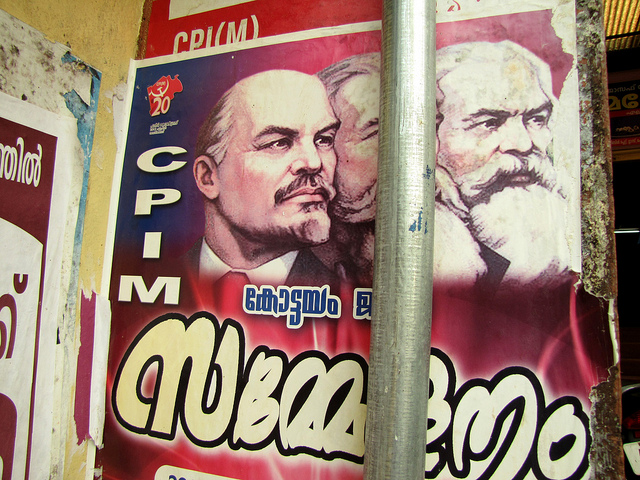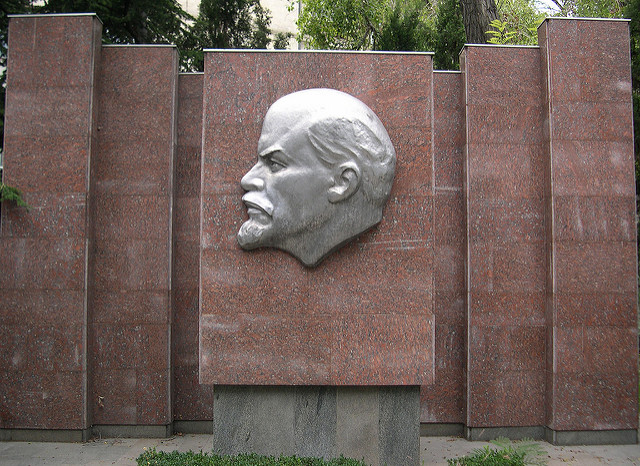Karl Marx wrote thirty-three articles on Indian affairs for the New York Tribune, from 1853, to 1858, just after the Sepoy Revolt. His most famous work on India is undoubtedly The Future Results of British Rule in India, published in July 1853. The essay deserves further examination in order to understand Marx’s complex positions on the British Empire.
It has become fashionable to call Marx an apologist for imperialism. This isn’t fair, even if he does write that “England has to fulfil a double mission in India: one destructive, the other regenerating the annihilation of old Asiatic society, and the laying the material foundations of Western society in Asia.” To be sure, passages like this one betray an imperial vantage point. But to condemn Marx outright on the basis of selective reading is to overlook the nuances in his actual positions, some of which outpaced those of Indian elites themselves, not to mention making it difficult to learn from his mistakes.
Marx does not let the British off easy. At one point, he argues quite polemically that “the profound hypocrisy and inherent barbarism of bourgeois civilisation lies unveiled before our eyes, turning from its home, where it assumes respectable forms, to the colonies, where it goes naked.” Marx also condemns the caste system, which Mahatma Gandhi never did, and supported the Indian Revolt of 1857, unlike the highly influential scholar Sayyid Ahmad Khan. But he gets into trouble because of factual inaccuracies and, above all, an obsession with historical progress that leads to dubious predictions about the future of Indian society.
Marx begins the piece by asking, “How came it that English supremacy was established in India?” He then sketches a brief history of social division and territorial conquest that ends with the Mughal Empire’s vulnerability to imperial domination in the 1850s. He concludes that “the question, therefore, is not whether the English had a right to conquer India, but whether we are to prefer India conquered by the Turk, by the Persian, by the Russian, to India conquered by the Briton.”
Marx believed that the Mughal Empire had stagnated to such a degree that it was bound to be conquered eventually. From his perspective, it was preferable that it be subjugated by a capitalist superpower that would lay the foundations of a broader social revolution. In other words, he wasn’t enthusiastic about imperialism per se, so much as he excited about the resistance to imperialism that British rule would, in his opinion, inevitably generate.
In his analysis, the British were bound to force India through a bourgeois revolution, because they would crush feudalism under the demands of modern industry. Villages would be connected by roads, telegraphs, and railway networks. Modern institutions would be supported by a skilled national military. In short, the British Empire would lead to modernisation, creating a newly centralised India, liberated from the oppressive isolation of rural life and the backwardness exemplified by the caste system. “Modern industry, resulting from the railway system, will dissolve the hereditary divisions of labor, upon which rest the Indian castes, those decisive impediments to Indian progress and Indian power.”
For someone with a deeper understanding of Indian history, it will be immediately clear that Marx didn’t fully understand his subject matter. Rural life was neither isolated nor entirely self-sufficient, with complex trading and irrigation networks that defied Marx’s image of villages driving “the dissolution of society into stereotype and disconnected atoms.” Marx seems to be projecting his readings of the English, French, and German peasantry onto an Indian context, without reflecting on how certain models may be specific to Europe. Indian villages were simply not defined by isolated communalism, even if bourgeois adventurers insisted otherwise. Arguably, this hadn’t been true in Europe either.

Of course, Marx can be partially forgiven for these mistakes, since he had neither the benefit of hindsight nor the century and a half of further scholarship that informs it. It would be a mistake to reject him completely based on problems in his source material. In this regard, it is worthwhile to compare his take on India with the more-or-less contemporaneous Eighteenth Brumaire, which demonstrates better information and fewer mistakes, on an issue that was much closer to home for him.
The biggest problem with his work on India, then, is not his lack of detailed knowledge, but the framework of historical materialism through which he is trying to force his analysis. Among other things, this approach leads him to make speculative claims repeatedly without real evidence. The Eighteenth Brumaire is brilliant precisely because Marx is at his best when his historical analysis is as concrete as possible. By contrast, when it comes to works like the Grundrisse — admittedly not a finished text — and his articles on India, Marx is fascinating but prone to making idealistic predictions that turn out to be false.
For instance, Marx predicts that the caste system would be flushed out by capitalist modernisation, as part of the British Empire’s destructive and regenerative impact on India. In reality, however, the British Raj ended up formalising castes in order to manage labour more effectively. Marx’s prediction was incorrect and based on a flawed historical vision where remnants of feudalism must necessarily be wiped out as capitalism evolves. But numerous examples, the development of India among them, reveals that pre-capitalist formations will only be displaced if they are an impediment to capital accumulation. That is why countries like the United Kingdom continue to host monarchies, and caste politics continue to divide India.

Marx also predicted that Indians would not “reap the fruits” of a new society until either a socialist revolution occurred in Britain, or once they “shall have grown strong enough to throw off the English yoke altogether” by themselves. While the latter did eventually happen first, Marx completely overstates the progressive impact of the British presence. This is a point Aijaz Ahmed emphasises in his book In Theory. Ahmed argues that, rather than the British crushing feudal backwardness, as Marx had predicted, they simply served as an external agent that dealt the finishing blow to a decaying civilisation that hadn’t quite yet been overthrown by significant internal movements that preceded their arrival. “Colonialism did not bring us a revolution. What it brought us was, precisely, a non-revolutionary and retrograde resolution to a crisis of our own society.”
In the end, colonialism didn’t do much to democratise Indian society. Although India has modern institutions like a parliament and bureaucracy, it has continued to pursue capitalist ambitions, brutally smashing anti-capitalist uprisings like that of the Naxalites. Yet, despite this troubling outcome, quite different from anything Marx had anticipated, it is still possible to use his terminology to be hopeful — if somewhat naïvely — about the future of South Asian politics.
It is true that colonialism ultimately did not lead to an opening of revolutionary horizons, instead fostering a cosmopolitan elite that worships Western civilisation, and uncritically equates “Indian,” “Pakistani,” and “Bangladeshi,” with “barbarian” and “uncivilised.” The British Empire also triggered the creation of nationalist movements that ironically depend on imperialist scholarship to have an image of ancient society to idealise, whether it be Hindu, Muslim, Sikh, etc.
Nevertheless, there are less depressing ways of regarding this history from a Marxist perspective. For example, Indian theorist and communist politician E. M. S. Namboodripad proposed an alternative model, in which socialist revolution would be realised by negating both the false liberalism of cosmopolitan elites, and the false nationalism of their nationalist opponents. Since both these falsehoods were and remain informed by colonial portrayals of Indian society, dialectically overcoming both of them would necessarily be crucial to Marx’s vision of a regeneration to offset the damage wrought by the destructiveness of British imperialism.
In the end, Marx’s confidence in historical progress must be reconciled with the reactionary narrative of villages functioning as the communal engines of peaceful sectarianism. His fantasy of autonomous villages that need to be transformed by colonial capitalism is ultimately too difficult to distinguish from the petit-bourgeois myth of rural purity that currently drives violent movements like Rashtriya Swayamsevak Sangh, and Prime Minister Narendra Modi’s ruling Bharatiya Janata Party.
It seems clear that until a means is found to vanquish them once and for all, South Asian progress will continue “to resemble that hideous pagan idol, who would not drink the nectar but from the skulls of the slain.”
Photographs courtesy of Groundhopping Merseburg, Wasili, and Babak Fakhamzadeh. Published under a Creative Commons License.





